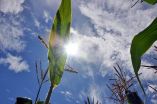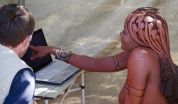INFORMATION:
http://www.pnas.org/content/early/2014/11/10/1412689111 END
Cold-induced pain linked to the garlic and mustard receptor
2014-11-13
(Press-News.org) Some people experience cold not only as feeling cold, but actually as a painful sensation. This applies even to fairly mild temperatures - anything below 20°C. A group of researchers from Lund University in Sweden have now identified the mechanism in the body that creates this connection between cold and pain. It turns out that it is the same receptor that reacts to the pungent substances in mustard and garlic.
Professor of Pharmacology Peter Zygmunt and Professor of Clinical Pharmacology Edward Högestätt have long conducted research on pain and the connection between pain and irritant substances in mustard, garlic and chilli. In large quantities, these strong spices can cause burning or irritant sensations in the mouth and throat, and can also cause rashes and swelling. When the eyes are exposed, these spices produce strong pain and lacrimation, a property that has been exploited in pepper spray and tear gas. The reason is that the substances affect nerves that are part of the pain system and that are activated by inflammation.
Ten years ago, the Lund research group identified the receptor for mustard and garlic, i.e. the way in which the pungent substances in the spices irritate the nerve cells. Since then, the question of whether this receptor also responds to cold has been a matter of debate. However, the researchers have now demonstrated that this is the case.
"We have worked with Professors of Biochemistry Urban Johanson and Per Kjellbom here in Lund to extract the human receptor protein and insert it into an artificial cell membrane. There we could see that it reacted to cold", explained Peter Zygmunt.
The findings increase our knowledge of the human body's temperature senses. However, they could also help all those who suffer from cold allodynia, i.e. who are over-sensitive to cold and experience pain when exposed to cold.
"These problems are very common in patients with chronic pain or diseases that affect the nervous system, such as diabetic neropathy. Patients undergoing chemotherapy can also become over-sensitive to cold as a side-effect of their medication. The discomfort and pain experienced by patients can start at relatively mild temperatures, within the temperature span to which the mustard and garlic receptor reacts", said Edward Högestätt.
Receptors for mustard and garlic are found in many locations in the body, including in the skin, bladder and gut. A number of pharmaceutical companies are now attempting to develop drugs to block the receptors in order to reduce problems such as itching, incontinence and pain. The Lund researchers believe that blocking the receptors ought also to relieve pain caused by cold.
Moreover, it is known that the mustard and garlic receptor reacts to chemical substances that irritate the airways. Possible new drugs for people who are affected by perfume, solvents, cigarette smoke, car exhausts and suchlike should therefore also benefit those who are over-sensitive to cold in the airways.
The discovery of the link between the mustard and garlic receptor and cold means that a further part of human temperature sensing has been charted.
"We already know that the chilli receptor not only reacts to chilli, but also to temperatures over 42°C, such as when you burn yourself on a fire. The menthol receptor reacts to temperatures under 28°C, which are perceived as pleasantly cooling. And now we know that the mustard and garlic receptor reacts to temperatures under 20°C", said Peter Zygmunt.
ELSE PRESS RELEASES FROM THIS DATE:
Bigger is not always better
2014-11-13
For several years the Danish health service has been moving towards increased centralisation and specialisation in large hospital departments based on the thesis that this provides better results for patients. A new study involving more than 12,000 Danish patients with hip fractures presents a different picture, however:
"Our study shows that the mortality rate for this group of patients is lower in the smaller hospital departments compared to the larger departments. We can also see that the length of stay in hospital is shorter and the quality of care is generally better, ...
Switching on a dime: How plants function in shade and light
2014-11-13
Stanford, CA--Photosynthesis is the process by which plants convert energy from the sunlight into chemical energy in the form of sugars. These sugars are used by plants to grow and function, as well as food for animals and humans that eat them.
Plants grow in environments where the availability of light fluctuates quickly and drastically, for example from the shade of clouds passing overhead or of leaves on overhanging trees blowing in the wind. Plants thus have to rapidly adjust photosynthesis to maximize energy capture while preventing excess energy from causing damage. ...
Moms with rheumatoid arthritis more likely to give birth prematurely
2014-11-13
Researchers from Denmark and the U.S. report that babies of women with rheumatoid arthritis (RA) or pre-clinical RA--the period prior to symptoms--are 1.5 times more likely to be born prematurely in Denmark. Findings published in Arthritis & Rheumatology, a journal of the American College of Rheumatology (ACR), indicate that body measurements of the baby at birth were only slightly lower in children exposed to maternal or preclinical RA compared to those with no exposure to the disease. Paternal RA was not found to impact fetal growth or preterm birth risk.
Roughly one ...
Did men evolve navigation skills to find mates?
2014-11-13
SALT LAKE CITY, Nov. 13, 2014 - A University of Utah study of two African tribes found evidence that men evolved better navigation ability than women because men with better spatial skills - the ability to mentally manipulate objects - can roam farther and have children with more mates.
By testing and interviewing dozens of members of the Twe and Tjimba tribes in northwest Namibia, the anthropologists showed that men who did better on a spatial task not only traveled farther than other men but also had children with more women, according to the study published this week ...
Pre-pregnancy body weight affects early development of human embryos
2014-11-13
New research indicates that the embryos of women who are overweight or obese at the time they conceive display distinct differences in early development compared to embryos from women of a healthy weight.
The results of the study, published today in the journal Human Reproduction, provide strong evidence for a direct link between what mothers eat and the ability of their fertilised eggs to divide and grow. The researchers claim this could potentially have long-term health implications for any children born from these embryos.
The four key findings of the study, which ...
Mongoose sentinels respond flexibly to threats
2014-11-13
Just as soldiers on sentry duty constantly adjust their behaviour to match the current threat level, dwarf mongoose sentinels exhibit flexible decision-making in relation to predation risk, new research from the University of Bristol has shown.
Biologists Julie Kern and Dr Andy Radford found that decisions about when to go on duty, what position to adopt and how long to remain on post were all affected by information about the likelihood of danger. Sentinels altered their behaviour depending on both environmental conditions, such as wind speed and social signals, such ...
Do homing pigeons navigate with gyroscope in brain?
2014-11-13
Human communication has long been associated with an unlikely companion, the homing pigeon; but how these pigeons find their way home is still largely a mystery. 'There is widespread agreement that pigeons are able to determine and maintain flight (compass) directions based on solar and magnetic cues,' says Hans-Peter Lipp from the University of Zurich, Switzerland, and Kwazulu-Natal University, South Africa. However, another piece of the puzzle - how the bird determines its position, known as the map sense - was unclear. Dissatisfied with the current theories - that pigeons ...
Climate change puts coastal crabs in survival mode, study finds
2014-11-13
SAN FRANCISCO, Nov. 12, 2014 -- Porcelain crabs can adapt to a warming climate but will not have energy for much else beyond basic survival, according to new research published today from San Francisco State University.
The findings have grim long-term implications for intertidal zone crabs as well as the myriad species that depend on them, and could be an indicator of how other intertidal organisms may respond to a rapidly changing climate.
The study is detailed in an article published in the Journal of Experimental Biology and is the first to explore intertidal zone ...
Prostate cancer researchers develop personalized genetic test to predict recurrence risk
2014-11-13
(TORONTO, Canada - Nov. 13, 2014) - Prostate cancer researchers have developed a genetic test to identify which men are at highest risk for their prostate cancer to come back after localized treatment with surgery or radiotherapy.
The findings are published online today in Lancet Oncology. Study co-leads Dr. Robert Bristow, a clinician-scientist at Princess Margaret Cancer Centre, and Dr. Paul Boutros, an investigator at the Ontario Institute for Cancer Research, report that the gene test provides a much-needed quick and accurate tool to determine with greater precision ...
Errors in single gene may protect against heart disease
2014-11-13
Rare mutations that shut down a single gene are linked to lower cholesterol levels and a 50 percent reduction in the risk of heart attack, according to new research from Washington University School of Medicine in St. Louis, the Broad Institute at Massachusetts Institute of Technology and Harvard, and other institutions.
The gene, called NPC1L1, is of interest because it is the target of the drug ezetimibe, often prescribed to lower cholesterol.
The study appears Nov. 12 in The New England Journal of Medicine.
Everyone inherits two copies of most genes -- one copy ...

